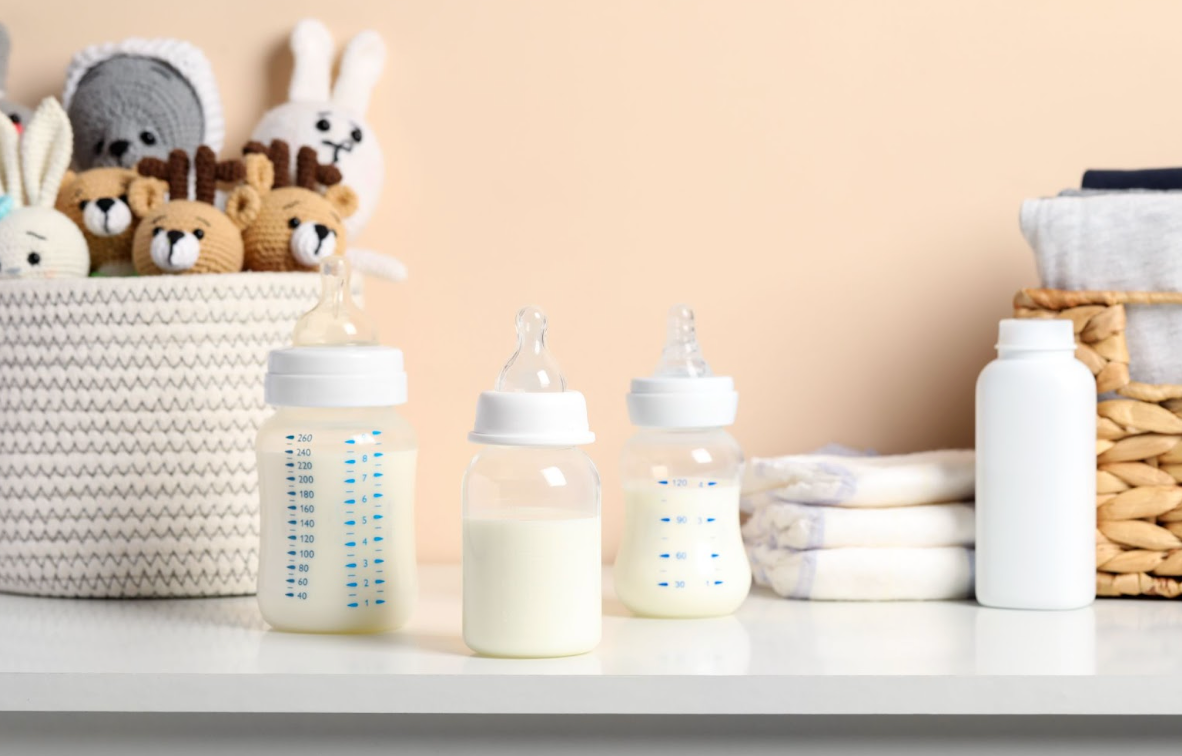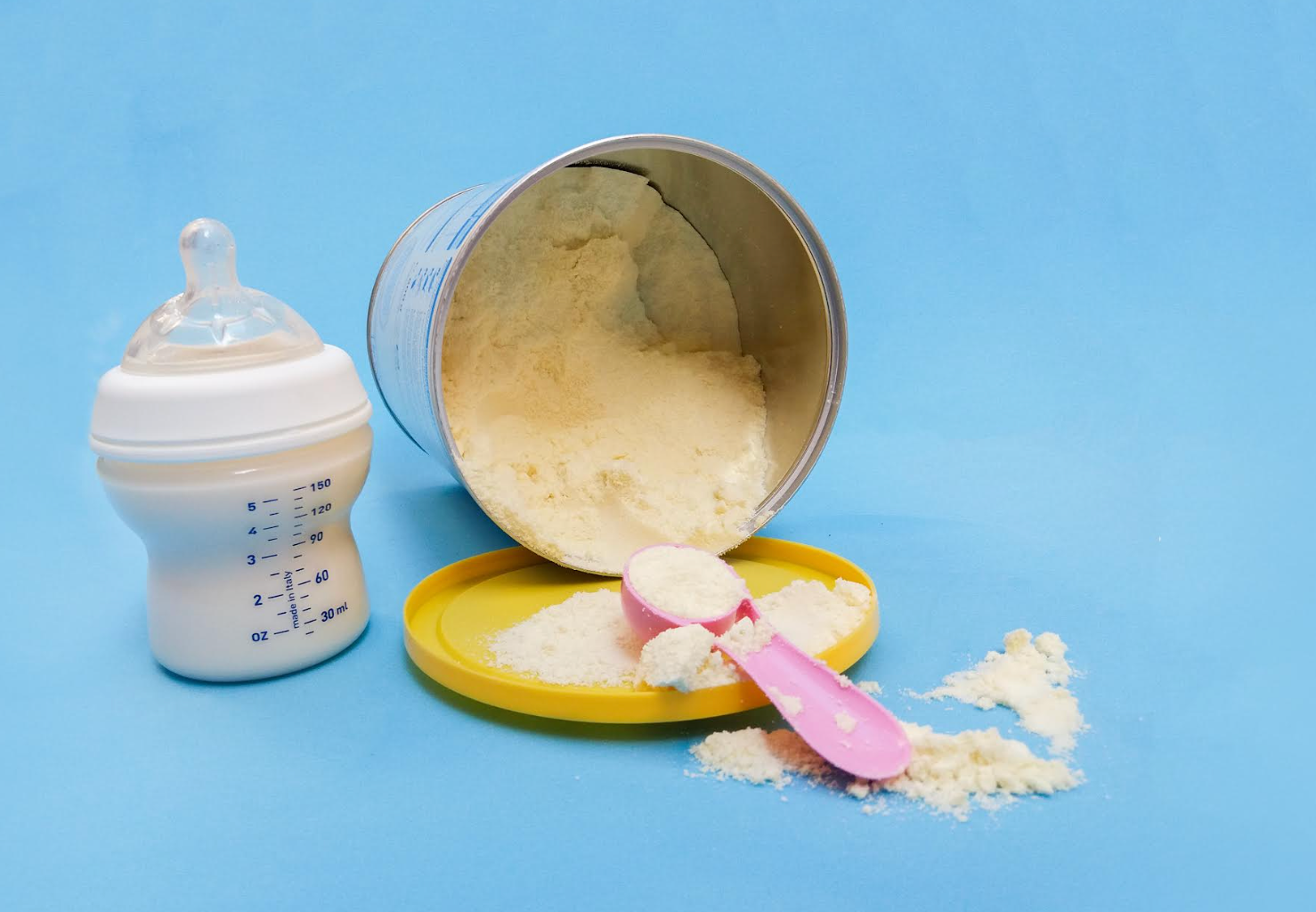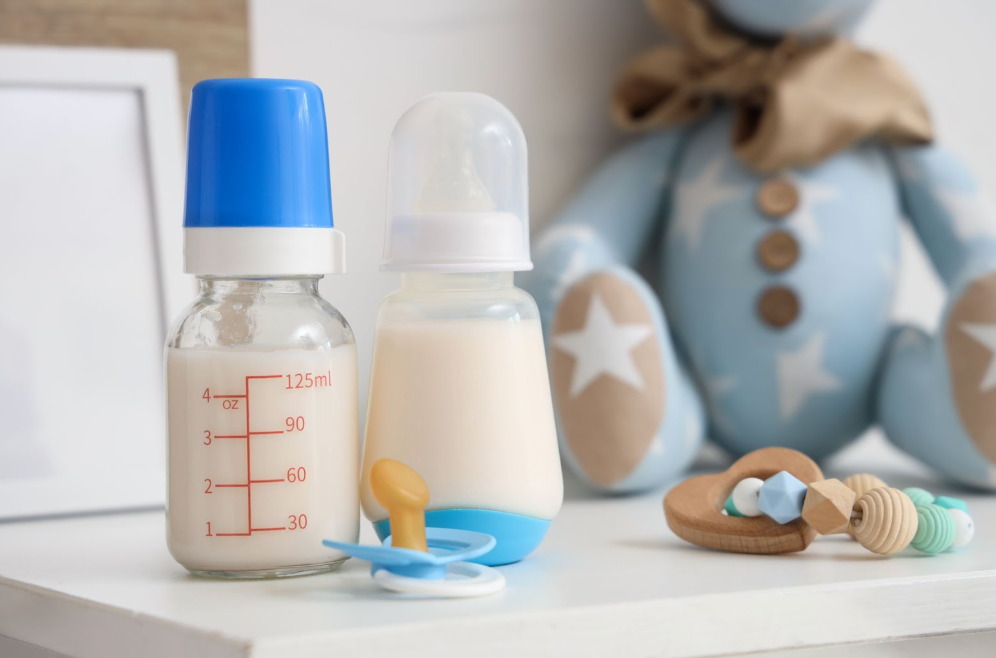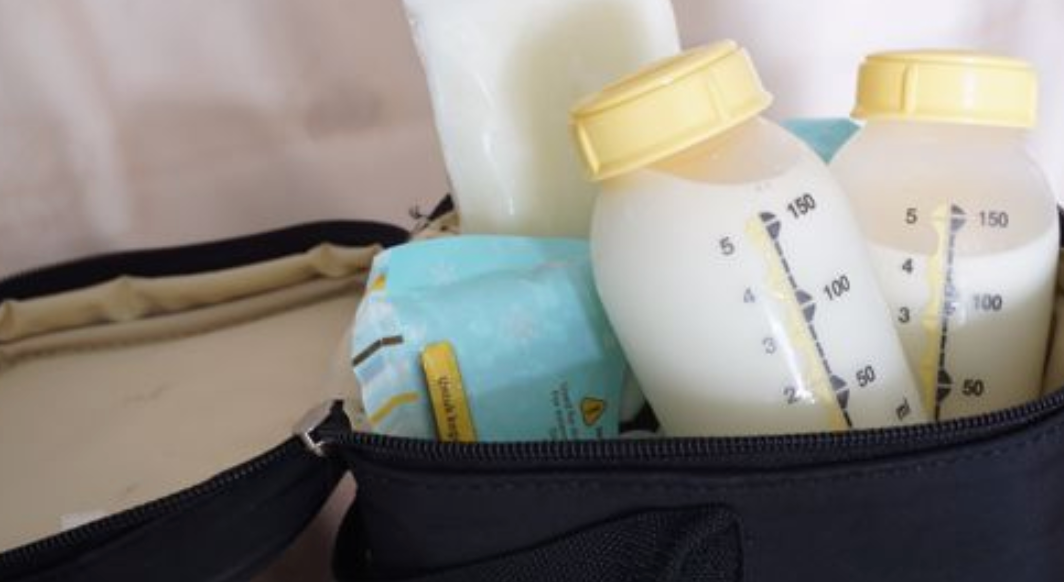Published October 6, 2025

Formula for Gassy Babies: Finding the Right Fit for Your Little One’s Tummy
If your baby seems extra fussy, squirmy or uncomfortable after feedings, you’re not alone — infant gas is incredibly common and can be tough on both of you. And if you're not sure what’s behind your little one’s digestive issues, it might just be their baby formula or feeding routine! While there’s no one-size-fits-all fix, what and how your baby eats can make a big difference.
We’re breaking down the common causes of gas, how to recognize it and which formulas may help bring your gassy baby — and you — some much-needed relief.
What Causes Gas in Babies?
Gas is a totally common part of infancy, and some of the most frequent culprits include:
-
Immature digestive systems: Many newborns simply haven’t developed the enzymes needed to break down certain ingredients, like lactose.
-
Swallowing air during feedings: Your baby may be swallowing air, especially if they’re feeding quickly or crying while eating, which can lead to trapped gas in the tummy.
-
Sensitivities to certain ingredients: Some little ones may be sensitive to specific ingredients in formula, such as lactose, corn syrup solids, intact milk proteins, or certain oils like palm oil— leading to digestive discomfort.
Plus, feeding methods matter, too! If your baby isn’t latched properly or is using a nipple flow that allows too much air, that could also be contributing to the problem.
Wondering if baby gas is an issue for your little one? Common signs include:
-
A bloated or firm belly
-
Frequent burping or passing gas
-
Fussiness (particularly after feeding)
While mild gassiness is normal, ongoing symptoms may signal a sensitivity or other issue. When in doubt, reaching out to your pediatrician can help guide the next steps and ensure your baby gets the comfort they need.


Your go-to resource for all things new baby.
Sign up to get the scoop on feeding, sleep, poop, and so much more.
By singing up for email, you are to receive marketing emails from Bobbie and can manage your email preferences or unsubscribe at anytime
How To Know if Your Baby’s Formula Isn’t the Right Fit
When your baby is gassy or uncomfortable, it’s natural to wonder whether their infant formula is helping — or making things worse. The truth is, not all formulas are created equal, and that’s actually a good thing! It means there are plenty of options to explore, so you can find the one that best fits your baby’s unique needs.
Differences in protein type (like intact vs. partially hydrolyzed proteins), lactose levels and added ingredients (such as certain oils or prebiotics) can all influence how a baby digests formula. But, what works for one baby might not suit another. That’s why it’s important to focus on what’s best for your little one, rather than sticking with the first option you try just because it’s popular or widely recommended.
So, how do you know if your baby’s formula might not be the right fit? Some signs to watch for include:
-
Frequent fussiness or crying during or after feeds
-
Excessive gas, bloating or spit-up
-
Signs of general discomfort after feeding
-
Disrupted sleep
If these symptoms persist, it could be time to consider switching to a different, gentler formula. Trust your instincts — you're the expert on your baby — and don’t hesitate to talk to your pediatrician for guidance.
Exploring Formula Choices That Support Digestion
If your baby is struggling with infant gas or digestive discomfort, choosing the right formula can make a big difference. Here are a few specialized options designed to support digestion and reduce symptoms like gas, bloating or spit-up:
Hypoallergenic Formula
Hypoallergenic options — either extensively hydrolyzed or amino acid-based — are made with proteins that are broken down into smaller parts, making them easier for a sensitive stomach to process. These formulas are often recommended for babies with cow’s milk protein allergies or digestive issues like persistent gas, reflux or eczema.
Partially Hydrolized Formula
Formulas with partially hydrolyzed proteins feature proteins that are also pre-digested into smaller fragments to help alleviate issues like gas, fussiness and overall digestive discomfort. Bobbie Organic Gentle®, for example, offers an easy-to-digest recipe modeled after breast milk — supporting smoother feedings without sacrificing the essential nutrition your baby needs.
Palm Oil-Free Formula
Palm oil can be tough on digestion for some babies. Palm oil-free formulas are often gentler on sensitive stomachs and may help reduce gas and constipation. Bobbie Organic skips palm oil entirely, using premium, organic ingredients to create a clean, breast milk-inspired formula that’s easier for babies to digest while still delivering complete nutrition.
Whole Milk Formula
Organic whole milk formulas are a great option for babies who are ready to transition to a richer, more complete milk source. Whole milk offers natural fats and proteins that support healthy growth and brain development, closely mimicking the benefits of breast milk. Bobbie Organic Whole Milk Infant Formula provides a clean, organic formula that’s easy on delicate tummies, free of palm oil, corn syrup and fillers!
Corn-Syrup vs. Lactose
Not every baby formula uses the same type of carbohydrates, and those differences can matter for digestion. While some rely on corn syrup, maltodextrin or sucrose, lactose is the natural sugar found in breast milk — and it’s what babies are best equipped to digest. That’s why Bobbie Organic Gentle® Infant Formula stands out as the only gentle formula in the U.S. to exclusively use lactose, with no added corn syrup or alternative sugars.
Bobbie Organic Gentle Infant Formula is the only baby formula in the U.S. market that offers 100% partially-hydrolyzed whey protein and 100% organic lactose as the carbohydrate source. Our gentle baby formula is easy on sensitive tummies to help alleviate fussiness from gas. Shop Bobbie Gentle today!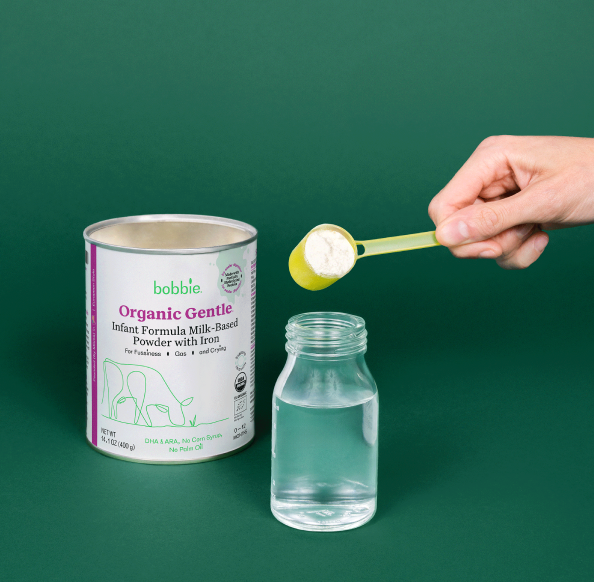
Shop Bobbie Gentle Organic Infant Formula
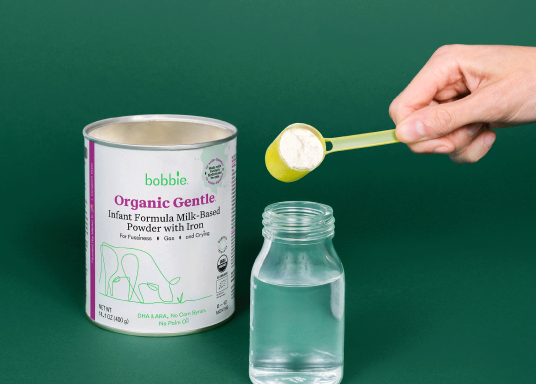
What To Look For in a Gentle, Nutrient-Rich Formula
When choosing a gentle formula for your baby, it’s important to make sure it still delivers complete nutrition. Key nutrients like iron, DHA, and vitamin D are essential for healthy development — so even if you’re switching to help with gas or fussiness, your baby’s formula should still check all the nutritional boxes.
There are also certain ingredients to consider for digestion support. Partially-hydrolyzed proteins may be easier on tiny tummies, and formulas made without palm oil are often gentler on digestion. Organic dairy and thoughtfully chosen ingredients can also offer peace of mind.
If your little one is struggling with gas, look for formulas that are labeled as easy to digest — these often include added whey proteins or contain broken-down milk proteins. Bonus points if the formula is organic, free from palm oil, and comes from a company that’s transparent about its ingredients and sourcing — like Bobbie! Because your baby deserves both comfort and quality nutrition.
Still searching for the perfect infant formula? Take the Find My Formula Quiz and discover the right fit for your little one!
Tips for a Smooth Formula Transition and Happy Feeding
Here are some tips to keep in mind as you make the switch to a more sensitive formula:
-
Consult your pediatrician: Always check with your baby’s doctor before making any formula changes to ensure it’s the right choice.
-
Patience pays off: Don’t rush — allow time for your baby to adjust before making multiple changes to their formula.
-
Transition gradually: Try mixing the old and new formulas gradually to help your baby adjust more comfortably.
-
Wait and see: Give the new formula 1-2 weeks to assess how well it’s working before making a final decision.
Managing feeding techniques alongside your formula choice can also support your baby’s comfort. Here are a few methods to try:
-
Bottle angle and slow-flow nipples: Keep the bottle angled to prevent your baby from swallowing air and use slow-flow nipples to encourage a calm feed.
-
Paced feeding: Let your baby control the flow of milk to minimize gas and prevent overeating.
-
Burping and baby positioning: Regular burping during and after feeds helps release trapped air, while proper positioning supports easier digestion.
-
Tummy time and bicycle leg movements: These gentle exercises can help relieve gas and encourage better digestion.
-
Consistency and calm environments: Maintaining a regular feeding schedule in a peaceful setting can reduce stress for both you and your baby.
Better Formula, Happier Tummies
Gas is totally normal in babies, but if your little one’s discomfort seems to linger, it might be time to try a formula that better suits their sensitive stomach. With your pediatrician’s guidance and a gentle formula, you can say goodbye to fussiness and hello to happier feedings.
On the search for a new formula for your gassy baby? Bobbie Organic Gentle Infant Formula is made with baby development in mind and modeled after breast milk — free of palm oil, corn syrup and fillers. Its easy-to-digest recipe helps support your little one’s health and comfort with every sip.
Shop Bobbie today!
The content on this site is for informational purposes only and not intended to be a substitute for professional medical advice, diagnosis or treatment. Discuss any health or feeding concerns with your infant’s pediatrician. Never disregard professional medical advice or delay it based on the content on this page.










